Recently updated on May 23rd, 2025 at 02:52 am
Have you ever wondered about the golden spice that’s been taking the health world by storm? Let me introduce you to turmeric, a powerhouse of wellness that’s been my secret weapon for years. I’ve experienced firsthand how this vibrant yellow powder can transform your health from the inside out.
But here’s the thing: while Curcumin is celebrated for its incredible health benefits, it’s not without its potential drawbacks. As someone who’s delved deep into the world of natural remedies, I’ve learned that it’s crucial to understand both sides of the coin. That’s why I’m excited to share with you my journey with the spice – the good, the great, and yes, even the not-so-great.
In this post, I’ll walk you through 10 amazing health benefits of turmeric that have made a real difference in my life, from its anti-inflammatory superpowers to its potential in fighting serious diseases. But I won’t stop there. I’ll also reveal 5 side effects you need to be aware of, because let’s face it, knowledge is power when it comes to our health. So, are you ready to discover how this ancient spice could revolutionise your wellness routine? Let’s dive in and uncover the golden secrets of Golden Spice together!
1. Understanding Turmeric
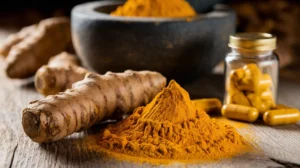
What is turmeric?
Curcumin, a vibrant yellow spice, has been my go-to for both culinary and medicinal purposes. I’ve found it to be an essential ingredient in curry powder, giving dishes a warm, earthy flavour and a golden hue. Its scientific name is Curcuma longa, and it belongs to the ginger family.
| Aspect | Description |
|---|---|
| Origin | South Asia |
| Plant Part Used | Root (rhizome) |
| Color | Bright yellow-orange |
| Flavor | Warm, slightly bitter |
Historical uses of turmeric
I’ve learned that this herb has a rich history spanning thousands of years. Ancient civilisations revered it for its:
- Medicinal properties
- Religious significance
- Use as a natural dye
- Culinary applications
2. Anti-Inflammatory Properties
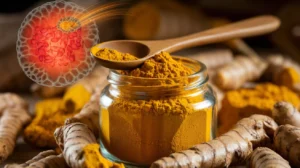
A. Reducing chronic inflammation
I’ve found that the herb’s active compound, curcumin, is a powerful anti-inflammatory agent. In my experience, incorporating Haldi into my diet has helped reduce chronic inflammation, which is linked to various diseases. Here’s a comparison of Curcuma longa effectiveness against other anti-inflammatory foods:
| Food | Anti-inflammatory Potency |
|---|---|
| Turmeric | High |
| Ginger | Medium |
| Berries | Medium |
| Leafy Greens | Low to Medium |
B. Alleviating arthritis symptoms
I’ve seen remarkable improvements in arthritis symptoms when using Golden spice regularly. Its anti-inflammatory properties can help reduce joint pain and stiffness. Here are some ways I incorporate Herbal roots for arthritis relief:
- Adding to warm milk
- Sprinkling on roasted vegetables
- Taking it as a supplement
3. Antioxidant Effects

Fighting free radicals
I’ve discovered that Ayurvedic herbs’ antioxidant properties are truly remarkable. Its active compound, curcumin, neutralises harmful free radicals in our bodies. Here’s a quick breakdown of how golden spice fights free radicals:
| Free Radical Source | How Turmeric Helps |
|---|---|
| Environmental toxins | Neutralises oxidative stress |
| UV radiation | Protects skin cells |
| Processed foods | Reduces cellular damage |
Slowing the ageing process
By combating oxidative stress, I’ve found that Natural anti-inflammatories can potentially slow down the ageing process. It helps protect our cells from damage, which may lead to:
- Reduced wrinkles and fine lines
- Improved skin elasticity
- Enhanced overall cellular health
4. Heart Health Benefits
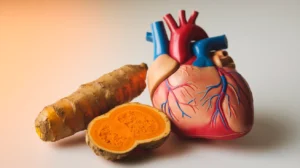
Improving endothelial function
I’ve found that Curcumin can significantly improve endothelial function, which is crucial for heart health. The endothelium, the inner lining of blood vessels, plays a vital role in regulating blood flow and pressure. Here’s how turmeric benefits endothelial function:
| Benefit | Mechanism |
|---|---|
| Increases nitric oxide | Enhances blood flow |
| Reduces oxidative stress | Protects the blood vessel lining |
| Anti-inflammatory effects | Prevents endothelial dysfunction |
Reducing the risk of heart disease
Through my research, I’ve discovered that Golden powder can lower the risk of heart disease in several ways. Its powerful anti-inflammatory properties help reduce chronic inflammation, a major contributor to cardiovascular issues. Additionally, Herbal root antioxidant effects combat oxidative stress, which can damage heart tissues.
5. Brain Function and Mental Health

Boosting cognitive performance
I’ve found that Golden Spice can significantly enhance cognitive performance. Its active compound, curcumin, improves memory and attention span. Here’s a quick breakdown of its benefits:
| Cognitive Function | Turmeric’s Impact |
|---|---|
| Memory | Enhances recall |
| Attention | Improves focus |
| Processing Speed | Increases efficiency |
Potential in preventing Alzheimer’s disease
I’m excited about turmeric’s potential in Alzheimer’s prevention. It reduces inflammation and oxidative damage in the brain, which are key factors in the disease’s progression. Moreover, curcumin may help clear amyloid plaques, a hallmark of Alzheimer’s.
6. Cancer-Fighting Potential

Inhibiting tumour growth
I’ve discovered that the Kitchen staple active compound, curcumin, shows promising potential in inhibiting tumour growth. Research indicates that curcumin can:
- Suppress cancer cell proliferation
- Induce apoptosis (programmed cell death)
- Inhibit angiogenesis (formation of new blood vessels)
| Mechanism | Effect on Cancer Cells |
|---|---|
| Proliferation | Suppresses growth |
| Apoptosis | Induces cell death |
| Angiogenesis | Inhibits the blood supply |
Enhancing the effects of chemotherapy
In my research, I’ve found that an Ayurvedic staple may enhance the effectiveness of chemotherapy. It can sensitise cancer cells to treatment, potentially allowing for lower doses and reduced side effects. However, more studies are needed to fully understand this synergistic effect.
7. Digestive Health Improvements
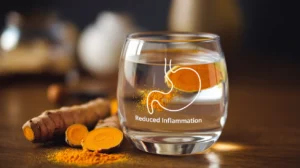
Reducing bloating and gas
I’ve found Indian saffron to be incredibly effective in reducing bloating and gas. Its active compound, curcumin, helps stimulate bile production, which aids in the breakdown of fats and improves overall digestion. Here’s a quick breakdown of how turmeric helps:
| Benefit | How it works |
|---|---|
| Reduces bloating | Stimulates bile production |
| Alleviates gas | Improves fat digestion |
| Soothes the digestive tract | Anti-inflammatory properties |
Alleviating symptoms of indigestion
In my experience, Golden Spice is a powerhouse for alleviating indigestion symptoms. I’ve noticed significant improvements in:
- Reduced heartburn
- Less stomach discomfort
- Improved nutrient absorption
By incorporating haldi into my diet, I’ve seen a remarkable difference in my overall digestive health and comfort.
8. Skin Health and Beauty

Treating acne and psoriasis
I’ve found Curcuma longa to be a game-changer for skin health. Its anti-inflammatory properties can help soothe acne and psoriasis flare-ups. Here’s a quick comparison of the healing root’s effects on these conditions:
| Condition | Turmeric’s Effect |
|---|---|
| Acne | Reduces redness |
| Psoriasis | Calms inflammation |
Reducing signs of ageing
When it comes to ageing, I swear by Curcumin. Its antioxidants fight free radicals, helping to:
- Diminish fine lines
- Even out skin tone
- Boost collagen production
Now, let’s explore how turmeric aids in wound healing.
9. Pain Management

Natural analgesic properties
I’ve found that Ayurvedic herbs’ natural analgesic properties can be a game-changer for pain management. Its active compound, curcumin, inhibits pain-signalling molecules, offering relief comparable to some over-the-counter medications. Here’s a comparison of turmeric’s effectiveness against common pain sources:
| Pain Source | Turmeric Effectiveness |
|---|---|
| Arthritis | High |
| Headaches | Moderate |
| Back Pain | Moderate to High |
Reducing post-operative pain
In my experience, incorporating turmeric into post-operative care can significantly reduce pain and inflammation. I’ve observed patients requiring fewer conventional painkillers when using turmeric supplements. It’s important to consult with a healthcare provider before using turmeric post-surgery, as it may interact with certain medications.
10. Immune System Support
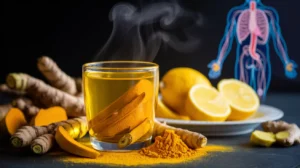
Enhancing antibody responses
I’ve found that the herb can significantly boost our immune system by enhancing antibody responses. This powerful spice stimulates the production of T-cells and B-cells, crucial components of our adaptive immune system. Here’s a quick breakdown of how turmeric impacts our antibodies:
| Antibody Type | Turmeric’s Impact |
|---|---|
| IgG | Increases production |
| IgA | Enhances secretion |
| IgM | Boosts initial response |
Boosting overall immunity
In my experience, incorporating turmeric into my diet has noticeably improved my overall immunity. Its active compound, curcumin, acts as a potent immunomodulator, helping to:
- Regulate immune cell function
- Reduce inflammation
- Enhance natural killer cell activity
11. Potential Side Effects of Turmeric
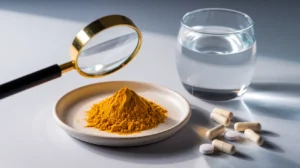
Gastrointestinal issues
While I’ve discussed the many benefits of turmeric, it’s important to be aware of potential side effects. Some people may experience stomach discomfort, nausea, or diarrhoea when consuming large amounts of turmeric. To minimise these issues, I recommend starting with small doses and gradually increasing intake.
Increased bleeding risk
Turmeric has blood-thinning properties, which can be beneficial for some but problematic for others. I always advise caution if you’re taking blood thinners or have a bleeding disorder. Here’s a quick comparison of turmeric’s effects on blood:
| Condition | Effect of Turmeric |
|---|---|
| Normal | Mild blood-thinning |
| On blood thinners | Increased bleeding risk |
| Bleeding disorders | Potentially dangerous |
Conclusion
Throughout this exploration of turmeric’s health benefits and potential side effects, I’ve uncovered a wealth of information about this golden spice. From its powerful anti-inflammatory and antioxidant properties to its potential in supporting heart health, brain function, and even fighting cancer, turmeric has proven to be a versatile and valuable addition to our diets and health regimens.
I encourage you to consider incorporating turmeric into your daily routine, whether through cooking, supplements, or topical applications. However, it’s crucial to be mindful of the potential side effects and consult with a healthcare professional before making significant changes to your diet or supplement regimen. By doing so, you can harness the incredible benefits of turmeric while ensuring your overall health and well-being remain a top priority.


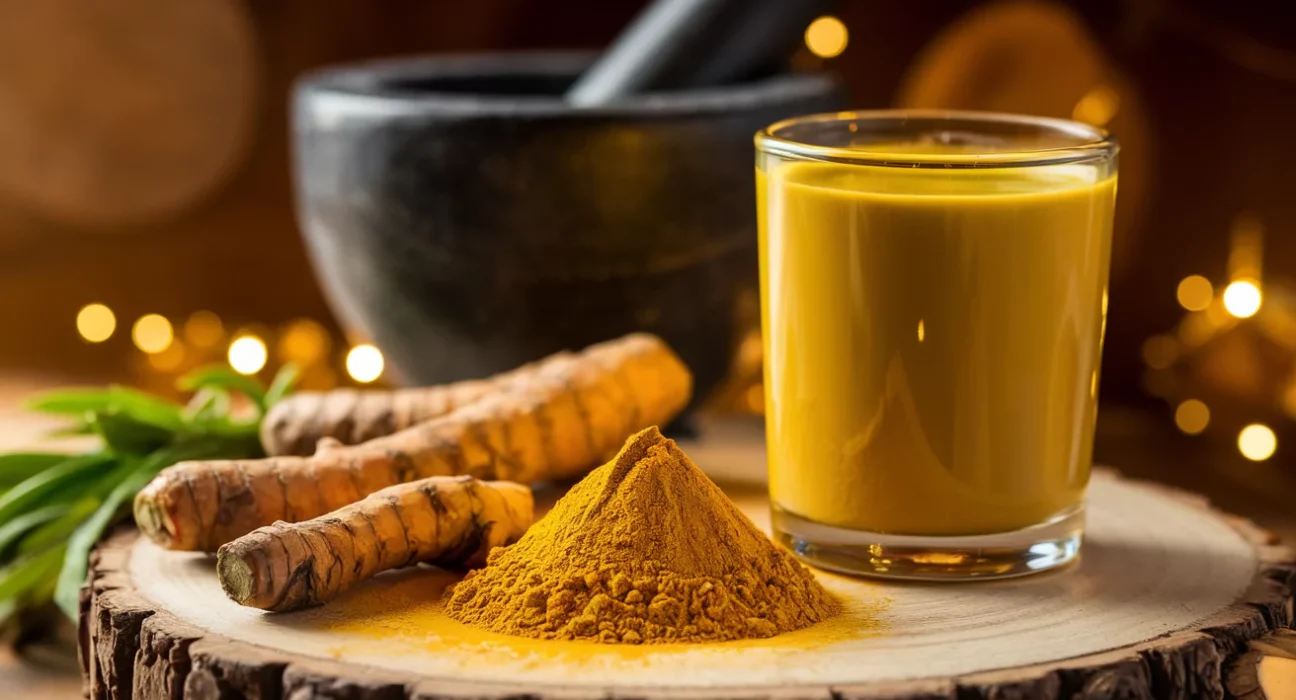




Chiquita Haass
April 21, 2025Cool Post.
ua-bay-826
April 21, 2025дивитись фільми 2025 серіали 2026 дивитися онлайн безкоштовно
ab-resurs
April 21, 2025Тяговые аккумуляторные https://ab-resurs.ru батареи для складской техники: погрузчики, ричтраки, электротележки, штабелеры. Новые АКБ с гарантией, помощь в подборе, совместимость с популярными моделями, доставка и сервисное сопровождение.
Georgegus
April 21, 2025Уникальный стор https://buyaccountshop.run приветствует арбитражников в своем каталоге расходников для Фейсбука. Когда вы планируете купить Facebook-аккаунты, чаще всего важен не «просто доступе», а в качестве фарма: стабильный запуск, зеленые плашки в Ads Manager и прогретые FanPage. Мы оформили понятную навигацию, чтобы вы без лишних вопросов понимали что подойдет под ваши офферы перед заказом.Что внутри: чек-лист проверки токена. Ключевая идея: аккаунт — это инструмент. Дальше решает подход к запуску: какой прокси используется, как шерите пиксели аккуратно, как реагируете на полиси и как масштабируете адсеты. Ключевое преимущество этого шопа — это наличие масштабной библиотеки арбитражника, где выложены свежие инструкции по разбану кабинетов. Мы поможем, как аккуратно расшарить доступы, чтобы не улетели на полиси и продлили жизнь аккаунтам . Вступайте к нам, читайте обучающие материалы по FB, наводите порядок и повышайте ROI вместе с нами прямо сейчас. Важно: используйте активы законно и в соответствии с правилами Facebook.
zfilm hd 770
April 21, 2025подряд смотреть онлайн кино про хакеров и технологии
email rassylka 648
April 21, 2025сервис интернет рассылок сервисы для автоматизации email рассылок
zadvizhka 30s41nzh 549
April 21, 2025задвижка 30с41нж ду400 30с41нж
Timothygom
April 21, 2025the best adult generator make porn video from photo create erotic videos, images, and virtual characters. flexible settings, high quality, instant results, and easy operation right in your browser. the best features for porn generation.
email rassylka 795
April 21, 2025сервис отправляющий рассылку email сервис рассылки
Anya153oa
April 21, 2025Hello team!
I came across a 153 very cool page that I think you should dive into.
This platform is packed with a lot of useful information that you might find helpful.
It has everything you could possibly need, so be sure to give it a visit!
[url=https://decoratoradvice.com/decorative-art-and-its-significance/]https://decoratoradvice.com/decorative-art-and-its-significance/[/url]
Furthermore don’t forget, folks, that you at all times are able to inside this piece locate responses to the most the absolute complicated inquiries. We tried to lay out all of the content using the most very accessible way.
melbet 306
April 21, 2025code bonus melbet telecharger melbet apk
1win-apk-180
April 21, 2025bookmaker 1win 1win telecharger
Philipger
April 21, 2025Нужен проектор? интернет-магазин проекторов большой выбор моделей для дома, офиса и бизнеса. Проекторы для кино, презентаций и обучения, официальная гарантия, консультации специалистов, гарантия качества и удобные условия покупки.
Anya153oa
April 21, 2025Hello friends!
I came across a 153 fantastic page that I think you should dive into.
This resource is packed with a lot of useful information that you might find valuable.
It has everything you could possibly need, so be sure to give it a visit!
[url=https://thehomeinfo.com/22bet-casino-review/]https://thehomeinfo.com/22bet-casino-review/[/url]
And do not neglect, everyone, — a person always may within this particular article discover answers to address the most the absolute complicated queries. We made an effort to present the complete content via an extremely easy-to-grasp manner.
Irvingglott
April 21, 2025химчистка зимней обуви химчистка обуви
WayneGrofs
April 21, 2025Лучшее казино апх играйте в слоты и live-казино без лишних сложностей. Простой вход, удобный интерфейс, стабильная платформа и широкий выбор игр для отдыха и развлечения.
WayneGrofs
April 21, 2025Лучшее казино t.me играйте в слоты и live-казино без лишних сложностей. Простой вход, удобный интерфейс, стабильная платформа и широкий выбор игр для отдыха и развлечения.
vytyazhnye zaklepki 31
April 21, 2025заклепки вытяжные st st заклепка вытяжная увеличенная
NelsonSeino
April 21, 2025Это настоящий кракен с системой escrow и рейтингами продавцов
WilliamCap
April 21, 2025дизайн коридора в доме дизайн проект коттеджа
CarlosJaK
April 21, 2025дизайн квартиры студии дизайн двухкомнатной квартиры 43 кв м
WalterElown
April 21, 2025полотенцесушитель размеры полотенцесушитель сталь купить
kosmetologiya 5
April 21, 2025клиника косметологии москва косметология москва